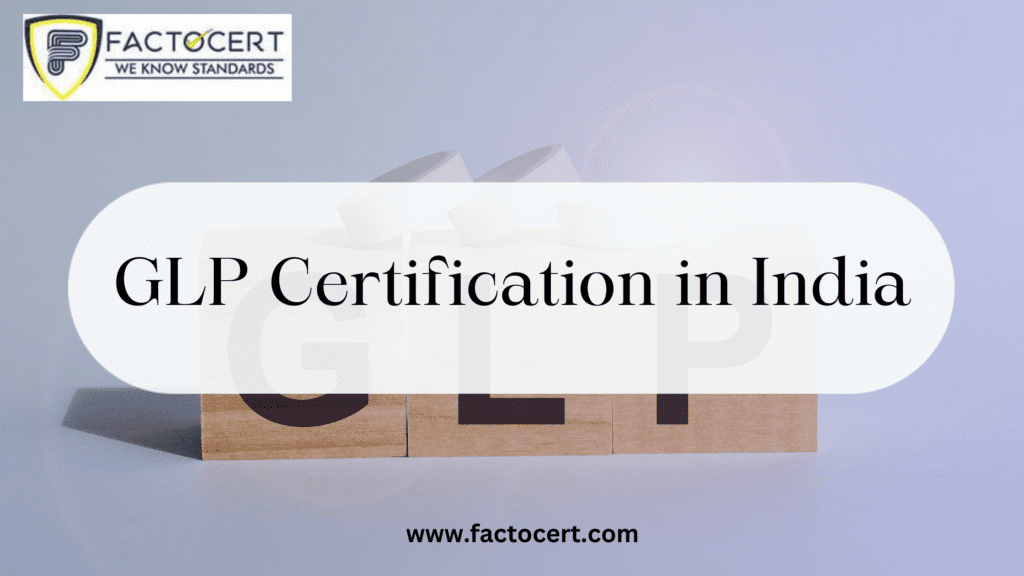GLP Certification, Good Laboratory Practices (GLP) are critical in assuring the dependability, integrity, and quality of laboratory data. GLP accreditation is a symbol of conformity to established standards and norms, assuring stakeholders of the reliability of research findings. Understanding the procedure and standards for GLP Certification in India is critical. In this blog article, we will look at GLP Certification and how to get it in India.
What is GLP Certification?
Good Laboratory Practices (GLP) is a collection of principles and recommendations for generating consistent and trustworthy results in laboratory investigations. GLP’s main goal is to improve the quality and validity of test results presented for regulatory reasons, such as pharmaceutical development and registration.
GLP Certification is the official confirmation that a laboratory or research facility adheres to the concepts and procedures outlined in GLP rules. This accreditation is often required for firms doing regulatory investigations, and it instils trust in the laboratory’s results.
Key Components of GLP Certification:
GLP Certification focuses on infrastructure and facilities.
One of the primary prerequisites for GLP Certification is the construction of adequate infrastructure and facilities. This comprises well-equipped labs with calibrated equipment, suitable sample and reagent storage conditions, and facilities that are conducive to the research operations.
GLP Certification requires detailed Standard Operating Procedures (SOPs).
These SOPs address all aspects of laboratory operations, ensuring that procedures are standardised, recorded, and consistently followed by all workers. Proper training and occasional updates are essential for adhering to SOPs.
workers Training and Qualification:
Qualifying and training laboratory workers are crucial for GLP compliance. Individuals participating in the conduct of research must have the requisite education, experience, and training to fulfil their duties effectively. Continuous training programs are vital for keeping staff up to date on the newest advances and approaches.
Quality Assurance:
Quality assurance is crucial for GLP Certification. Laboratories must develop a strong quality assurance section tasked with monitoring and auditing all elements of the research. This encompasses data integrity, SOP adherence, and GLP compliance. Regular internal and external audits are carried out to guarantee continuous compliance.
Documentation and Record-Keeping:
GLP Certification requires accurate and complete documentation. Laboratories must keep detailed records on all parts of the investigation, from experimental design to data analysis. This documentation acts as proof of compliance and aids in the traceability and repeatability of outcomes.
Steps to get GLP Certification in India:
Learn about GLP regulations:
The first step towards GLP Certification is to comprehend the GLP rules that apply in India thoroughly. Familiarise yourself with the norms and standards established by regulatory agencies such as the Central Drugs Standard Control Organization (CDSCO) and the Ministry of Environment, Forest, and Climate Change.
Conduct a Gap Analysis:
Compare your current laboratory setup, methods, and documentation to GLP criteria. Identify gaps and opportunities for improvement to ensure compliance with GLP requirements. This gap analysis is critical for creating a focused and successful action plan.
Create and Implement SOPs:
Use gap analysis to create complete SOPs for all laboratory operations. Ensure that these SOPs are strictly followed by all people and provide systems for frequent evaluations and modifications.
Invest in infrastructure and facility modifications to comply with GLP requirements.
This might include purchasing new equipment, installing temperature-controlled storage options, and maintaining a clean and orderly laboratory environment.
Provide necessary training for laboratory workers,
including technical and compliance issues. This might involve training in specialised techniques, instrument operation, and awareness activities on GLP principles and standards.
Quality Assurance Setup:
Create a strong quality assurance unit in the laboratory. This unit should be autonomous and in charge of performing frequent internal audits to guarantee continuous compliance. Regulatory agencies or third-party Certification organisations may also perform external audits.
Establish a thorough documentation and record-keeping system.
Ensure that all parts of the investigation, including study procedures, raw data, and final reports, are well recorded, structured, and easily retrievable. To ensure compliance, documentation processes should be reviewed and updated on a regular basis.
Consider Third-Party Certification:
Once you’ve made essential improvements and are confident in your laboratory’s compliance with GLP requirements, consider pursuing third-party Certification. Contact recognized certifying agencies that specialise in GLP Certification. Before giving the Certification, they will thoroughly evaluate your laboratory processes and facilities.
Why Choose Factocert GLP Certification in India?
Factocert is one of India’s leading GLP Certification providers. We provide GLP Consultant services in India. We are trusted GLP Certification Bodies in India and provide services in different states such as Mumbai,Bangalore,Delhi etc for consultation visit our website www.factocert.com or you can also get in touch with us at contact@factocert.com and factocert also provide different ISO Standards like ISO 27001, ISO 9001, ISO 45001, ISO 13485, ISO 17025, ISO 14001, ISO 22000, etc… At a better cost.
Conclusion
Obtaining GLP Certification in India is a thorough procedure that requires dedication, resources, and attention to detail. It is a quest to ensure the greatest levels of quality and dependability in laboratory experiments, eventually contributing to scientific and technological advancements. By following the procedures provided in this book, labs may confidently travel the route to GLP accreditation, establishing themselves as valuable contributors to the scientific community and sectors that rely on accurate and trustworthy data.
For More information visit:GLP Certification in India





